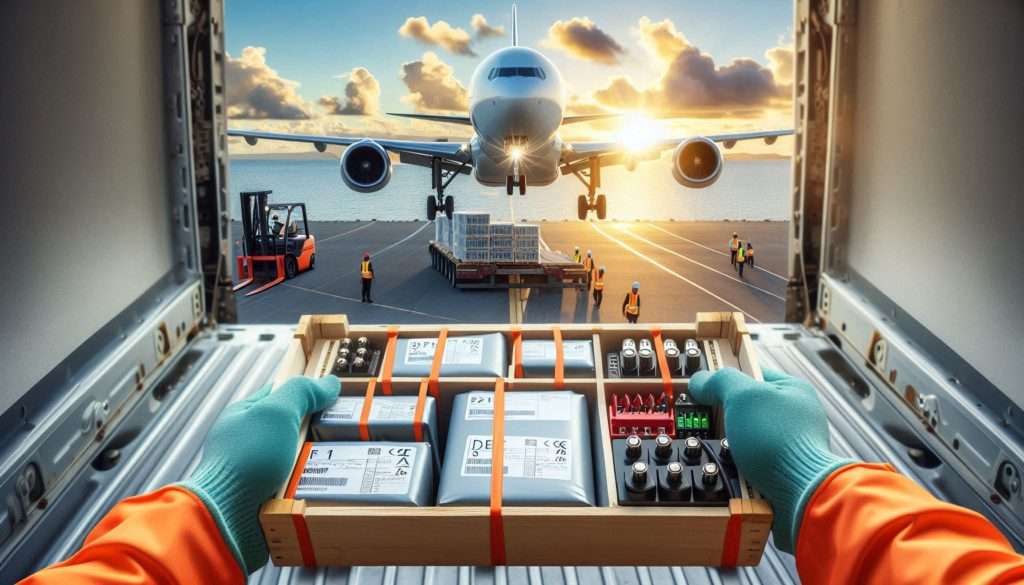This case study explores the challenges and solutions encountered in shipping lithium batteries via air freight, with a particular focus on ensuring safe delivery to the customer’s doorstep. Lithium batteries, highly efficient power sources utilized in various electronic devices, present regulatory complexities during transportation due to safety concerns. This study illustrates how a logistics company addressed these challenges to offer seamless door-to-door delivery services for shipping lithium batteries.
Due to their high energy density, lithium batteries serve as power sources for a wide array of devices, spanning from smartphones to electric vehicles. Nonetheless, transporting them presents notable safety risks, particularly when done via air freight. Strict regulations are in place to manage their shipment and minimize potential hazards. This case study investigates how a logistics company tackled these challenges to guarantee the secure and effective delivery of lithium batteries to customers.
Shipping Lithium Batteries background
The transportation of lithium batteries is regulated by international and national authorities such as the International Air Transport Association (IATA) and the International Civil Aviation Organization (ICAO). These regulations classify lithium batteries based on their chemistry, size, and intended use, imposing restrictions on their transportation via air freight. Failure to comply with these regulations can lead to severe consequences, including fines, delays, and even safety hazards.
Subscribe to the Ex-works24/7 newsletter
Strategy in Shipping Lithium Batteries
Ex-works is a logistics firm specializing in air freight services faces the task of shipping lithium batteries for a client in the electronics sector. The client sought door-to-door delivery of lithium-ion batteries to various global destinations. In response, the logistics company employed the subsequent strategies:
Expertise in Regulations: The company designated a dedicated team to remain abreast of the latest regulations governing lithium battery transportation. This team ensured that all shipments adhered to the standards set by organizations like IATA, ICAO, and other pertinent regulatory bodies.
Specialized Handling: Trained personnel meticulously managed lithium battery shipments, following stringent safety protocols. They utilized specialized equipment and facilities designed to minimize the risk of mishaps or mishandling.
Tailored Packaging Solutions: Collaborating with packaging experts, the logistics company devised custom solutions for safely shipping lithium batteries. These solutions encompassed the use of flame-retardant packaging materials, shock-absorbent padding, and thermal insulation to safeguard the batteries during transit.
Precision in Documentation: The company implemented rigorous documentation procedures to ensure the precise completion of shipping forms and declarations. This streamlined customs clearance processes and mitigated the risk of regulatory violations.
Real-time Monitoring: Sophisticated tracking and monitoring systems were deployed to offer real-time visibility into the status and whereabouts of lithium battery shipments. This facilitated proactive intervention in the event of potential issues or delays.
Shipping Lithium Batteries results
Through the adoption of these strategies, the logistics firm attained the subsequent results:
1. Regulatory Compliance: Every lithium battery shipment met regulatory standards, thereby diminishing the likelihood of penalties and delays.
2. Enhanced Safety: Instances of damage or mishandling during transit were minimized, thereby bolstering safety for both staff and cargo.
3. Improved Efficiency: Streamlined processes and real-time monitoring bolstered the efficiency of door-to-door delivery services, culminating in heightened customer satisfaction.
4. Enhanced Reliability: The logistics company solidified its reputation as a dependable partner for lithium battery shipping, garnering trust and confidence from clients within the electronics industry.
Conclusion: Shipping lithium batteries via air freight presents significant challenges due to safety regulations and concerns. However, with careful planning, expertise, and specialized solutions, logistics companies can ensure the safe and efficient delivery of these critical components to customers worldwide. By addressing regulatory compliance, safety protocols, packaging requirements, and documentation accuracy, companies can mitigate risks and provide reliable door-to-door delivery services for lithium batteries.




